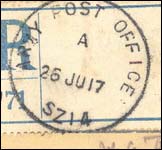 Trans Pacific National Bank recently agreed pay $12,500 penalty to the Office of Foreign Assets Control (“OFAC”) to settle charges that it had facilitated transactions by a foreign person where the transactions by the foreign person would be prohibited if performed by a United States person. The facilitation consisted of initiating two wires for one of its account holder relating to a transaction between a foreign person and Iran. The foreign transaction itself did not violate U.S. law.
Trans Pacific National Bank recently agreed pay $12,500 penalty to the Office of Foreign Assets Control (“OFAC”) to settle charges that it had facilitated transactions by a foreign person where the transactions by the foreign person would be prohibited if performed by a United States person. The facilitation consisted of initiating two wires for one of its account holder relating to a transaction between a foreign person and Iran. The foreign transaction itself did not violate U.S. law.
The recipient of the wire was not located in Iran. In fact, the only reference to Iran with respect to the wires were entries in the instructions that in one case referenced “Iran materials” and in the other referenced “Iranian materials.” The lesson to be learned here is that all parts of a wire must be screened for any reference, no matter how oblique, to a sanctioned country. In citing mitigating factors, OFAC noted that the bank had enhanced its screening procedures to require that the “memorandum information of each wire transfer also be reviewed for OFAC sanctions references.”
(I missed this latest round of OFAC civil penalties information on February 1 because OFAC has inexplicably stopped announcing the monthly release of civil penalty information on the “Recent Actions” page of its website. Concomitantly, OFAC appears to have stopped sending email announcements of the release of this information, or at least I didn’t get that email this month.)

 Posted by
Posted by  Category:
Category: 

 If there is anything that qualifies as a true urban legend in the export areas, it’s the surprisingly widespread belief that shipments to overseas APO and FPO addresses aren’t exports. Of course, that’s no more true than the belief that the fate of a rider on an equestrian statute can be determined by the position of the horse’s hooves. (
If there is anything that qualifies as a true urban legend in the export areas, it’s the surprisingly widespread belief that shipments to overseas APO and FPO addresses aren’t exports. Of course, that’s no more true than the belief that the fate of a rider on an equestrian statute can be determined by the position of the horse’s hooves. ( Let’s say that you were an agency like the Bureau of Industry and Security (“BIS”) and you had a huge and complex list of sensitive items that needed a license for export. Now, unless your administrative goal was to collect a bunch of fines for illegal exports, you would make that list easily and readily available, wouldn’t you? You would think.
Let’s say that you were an agency like the Bureau of Industry and Security (“BIS”) and you had a huge and complex list of sensitive items that needed a license for export. Now, unless your administrative goal was to collect a bunch of fines for illegal exports, you would make that list easily and readily available, wouldn’t you? You would think. The Bureau of Industry and Security (“BIS”) previously did battle with cloud computing in an
The Bureau of Industry and Security (“BIS”) previously did battle with cloud computing in an  As the Space Shuttle is headed for the mothballs, NASA wants to
As the Space Shuttle is headed for the mothballs, NASA wants to 

